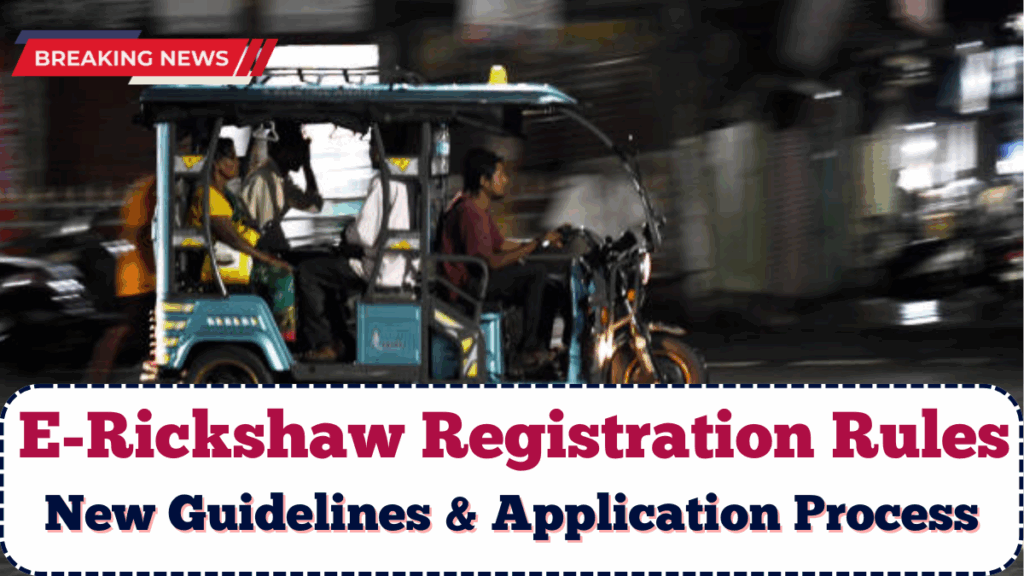The E-Rickshaw Registration Rules India 2025 are now active nationwide, simplifying the process for owners and drivers of battery-operated three-wheelers to get their vehicles legally registered. With e-rickshaws becoming a preferred mode of urban and rural transport, the government has updated its RTO policy to improve safety, formalize driver employment, and bring consistency across state transport departments.
Whether you’re an individual purchasing a new e-rickshaw or a fleet operator managing several units, these new registration norms will help streamline operations, ensure compliance, and give legal status to your vehicle.

Key Changes in E-Rickshaw Registration Process 2025
The 2025 policy introduces several upgrades over previous frameworks, especially in terms of documentation, insurance, and vehicle identification. The process now includes centralized digital approvals through the Vahan platform and uniform guidelines across all states and union territories.
Major updates under the registration 2025 process:
-
Mandatory Aadhaar-linked digital verification for owners
-
Online registration through the Parivahan/Vahan portal only
-
Vehicle must comply with CMVR safety norms (Central Motor Vehicles Rules)
-
Clear vehicle classification as L5 (electric three-wheeler)
-
RTOs to issue digital RC and smart plates with embedded QR codes
-
Compulsory valid insurance and PUC certificate
| Requirement Category | Updated Rule (2025) |
|---|---|
| Owner ID Proof | Aadhaar with mobile OTP verification |
| Vehicle Norms | Must meet CMVR and ARAI certification |
| Registration Channel | Online via RTO or dealership-integrated system |
| Road Tax | Exempted in most states |
| Insurance | Valid third-party insurance required |
These changes ensure that e-rickshaw India operations are safer, legal, and supported by digital tools.
Step-by-Step Application Process for E-Rickshaw Registration
The E-Rickshaw Registration Rules India 2025 have made the process easy to follow, especially for new drivers. Most of the steps can now be completed online through the Parivahan portal or via authorized e-rickshaw dealerships.
Steps to register an e-rickshaw:
-
Visit the Vahan Parivahan portal
-
Select “New Vehicle Registration” and choose your RTO
-
Upload required documents (RC, invoice, insurance, Aadhaar, etc.)
-
Schedule a fitness inspection at the local RTO if required
-
Pay the applicable registration fee online (may be waived in some states)
-
Receive e-RC (digital Registration Certificate) and number plate
For fleet buyers or commercial use, some states also provide bulk registration options and integration with business PAN and GST accounts.
Documents Required for Registration
To comply with the RTO policy for 2025, you’ll need to provide digital copies of key documents. In most cases, physical visits are not needed unless inspection is required.
Required documents:
-
Aadhaar card linked with mobile
-
Proof of address (utility bill/ration card/rent agreement)
-
Invoice and chassis number of the e-rickshaw
-
Third-party insurance certificate
-
Roadworthiness certificate (if applicable)
-
Form 20 and Form 21 (usually provided by dealer)
-
Passport-size photograph
Having these documents ready ensures a faster turnaround and smoother approval.
Benefits of Updated E-Rickshaw Rules in 2025
The e-rickshaw India policy changes are designed to benefit not only vehicle owners but also passengers and transport regulators. A formal registration system offers legal protection, financial inclusion, and access to subsidies.
Key benefits include:
-
100% road tax exemption in states like Delhi, UP, Bihar, and Odisha
-
Access to e-rickshaw loans and financing schemes
-
Eligibility for driver welfare programs and government subsidies
-
Enhanced passenger trust and safety
-
Faster service approvals for e-rickshaw aggregators and fleet operators
This move is also aligned with India’s national goal of achieving 30% electric mobility by 2030.
FAQs
What are the new e-rickshaw registration rules in India for 2025?
The new rules require digital Aadhaar verification, online registration via the Vahan portal, CMVR compliance, valid insurance, and digital RC issuance.
Do I need to visit the RTO to register my e-rickshaw?
In most cases, no. The process is now completely online unless a fitness inspection is needed.
Is road tax applicable on e-rickshaws in 2025?
No, road tax is fully exempt in most Indian states for e-rickshaws registered in 2025.
Can I register a second-hand e-rickshaw under the new rules?
Yes, but the vehicle must meet fitness and emission standards and be transferred to your name with a new RC.
What documents do I need for registration?
You need Aadhaar, address proof, invoice, insurance certificate, and forms 20/21. Your dealer usually assists with this process.
Are government subsidies linked to registration?
Yes, many central and state subsidies require proof of registration to release financial support or loan benefits.
Click here to know more.
Pari is a passionate writer known for captivating stories that blend imagination and reality. Inspired by travel, history, and everyday moments, Pari crafts narratives that resonate deeply with readers.
